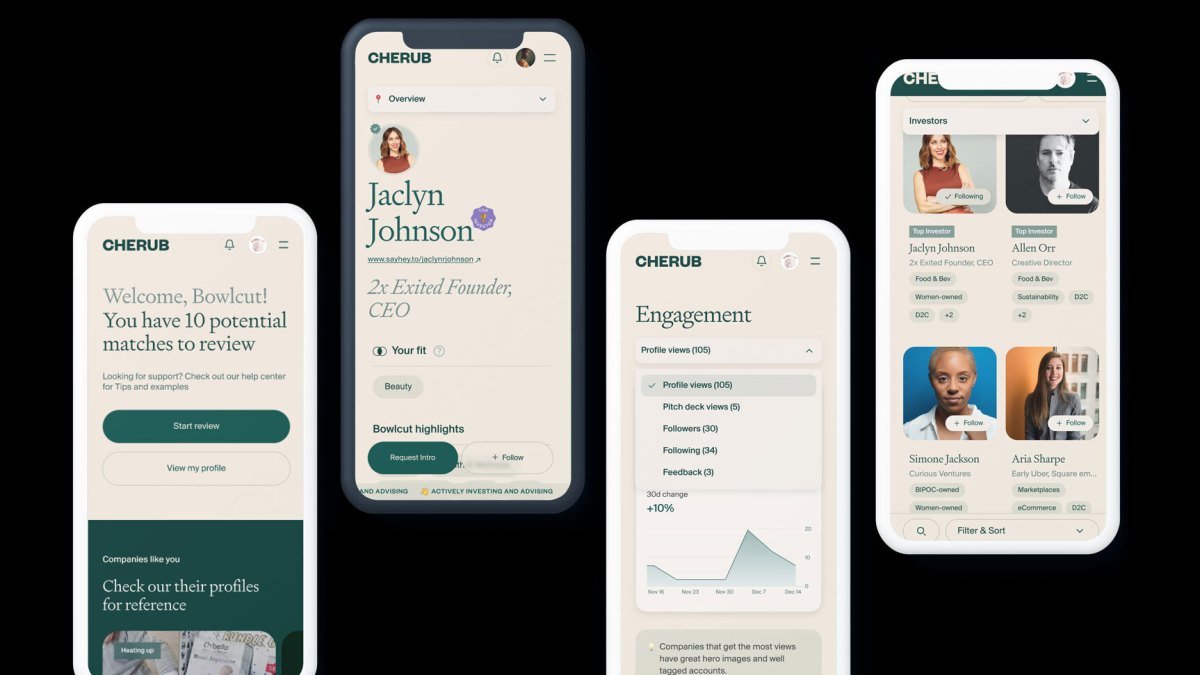Jaclyn Johnson and Angeline Vuong were reflecting on the complexities of angel investing while out on a hike. Little did they know that this conversation would lead to the genesis of a new startup idea.
Their creation, Cherub, is a marketplace that brings together angel investors and entrepreneurs, co-founded by Johnson and Vuong themselves. This dynamic duo brings a wealth of experience to the table – Vuong spent five years focusing on product and growth at Opendoor, while Johnson is the founder of Create & Cultivate, a “media company for ambitious women.” She has also ventured into the world of investing as both a founder and an investor, even selling her own startup, No Subject, in 2016. She has also invested in a number of other companies, including popular luggage company Away.
Comparing their Los Angeles-based platform to Raya, an exclusive dating community, Johnson explains that Cherub matches investors and founders based on their interests and preferences. Both parties can access the platform and express interest in potential matches through tags, allowing for more targeted and efficient connections.
One unique aspect of Cherub is that investors and entrepreneurs can see who has shown interest in them on the backend. If the feeling is mutual, they can make a connection. However, if a founder isn’t interested in a particular investor, they can reject the invitation to connect. Additionally, founders can specify their minimum investment amount, so investors can see if they are a good fit before reaching out.
“We’re sort of using dating app mechanics in a way… So we jokingly call it the Raya for deal flow,” Johnson explains.
Cherub initially tested the concept by launching a weekly newsletter, which garnered 1,500 sign-ups within just three weeks through word of mouth. Encouraged by this response, Johnson and Vuong built out an alpha product last summer and featured 40 companies. Investors could request a deck for these companies, and Johnson notes that all 40 received requests and half resulted in introductions. Ultimately, 20% of these introductions led to funding, collectively generating $1.1 million in capital.
Even more exciting, 40% of these deals were from new angel investors – those who were accredited but had never invested before. With its slow launch now in progress, Cherub has 100 startups on the platform and has generated $50,000 in revenue. They have a goal of growing to 500 startups and have a waitlist of 1,500, according to Johnson.
Cherub operates on a membership model and is free for investors to use. Founders can sign up for a $480/year membership, which allows them to list their company in the directory and receive analytics on their deck views. The more exclusive Cherub Select membership costs $950 a year and provides a more vetted process, giving the company the opportunity to be more actively shown to investors.
In addition to connecting investors with startups, Cherub also helps founders find incubators and accelerators. They have partnerships with top incubators such as Andreessen Horowitz, Dream Ventures, and New York Fashion Tech Lab. Investors can also gain access to data on startups, such as updates on their performance and funding status.
Though there are other platforms that connect angels and entrepreneurs, Johnson believes that Cherub stands out in a few ways. For one, their focus on consumer packaged goods (CPG) companies sets them apart, though they also showcase AI companies, hotels, apps, and more. AngelList is more geared towards B2B companies and may be better suited for those who already have experience with startup investing and can afford larger investments. On the other end of the spectrum, crowdsourcing platforms like Wefunder and Republic allow for smaller investments, even as low as $100.
Cherub falls somewhere in the middle, hosting “founder-funder mixers” similar to traditional VC firms. Last year, they partnered with Sophia Amoruso’s Trust Fund to host a cocktail party where everything was “investable” – from the drinks being served to the pop-up shop offering products to test drive. From this event alone, $400,000 in deals were generated.
One angel investor, Allen Orr, expressed his preference for Cherub’s personalized and social approach to investing, noting that he had previously used platforms like AngelList but found them to be too transactional.
“I also liked that there are opportunities not just for investment, but also advising brands,” he said.
Maggie Rose Macar, founder and CEO of mental health support app Zant, shared her positive experience with Cherub, noting that an investor wrote a $25,000 check into her company after it was featured in one of their newsletters and they met in person at a Cherub event.
“I think Cherub does a great job at bringing active investors into the room with founders who are looking,” she said.
Cherub has raised $1.25 million from various angel investors, including Alli Webb of Drybar and Morgan DeBaun of Blavity.








